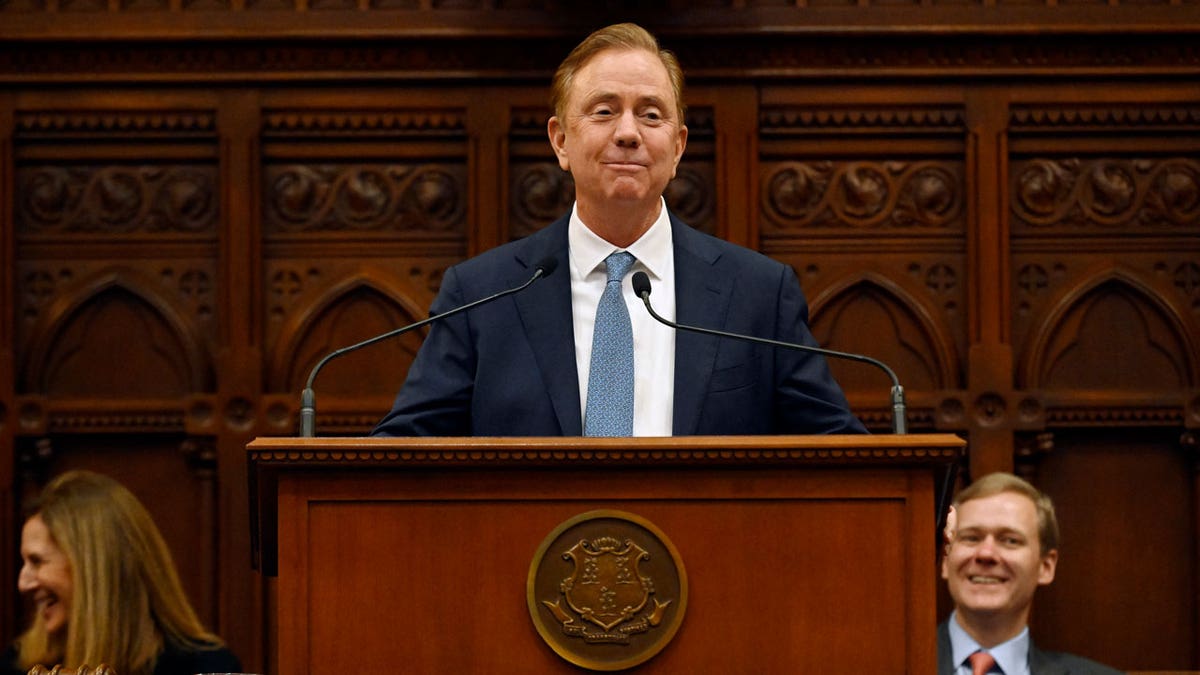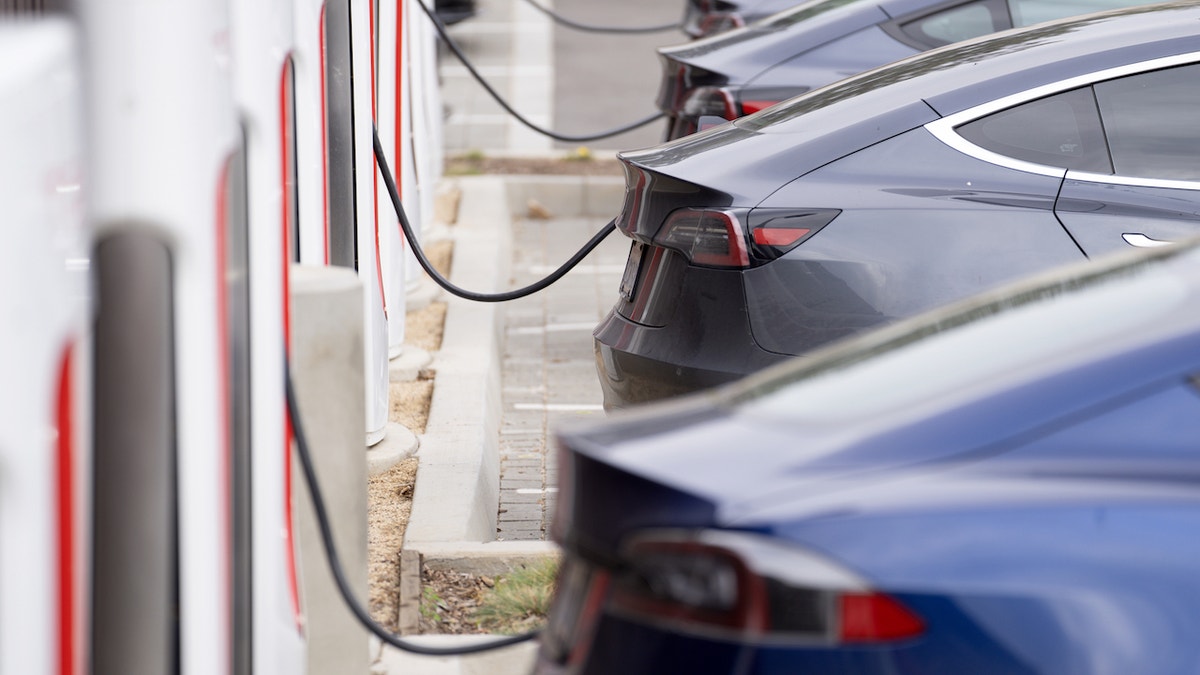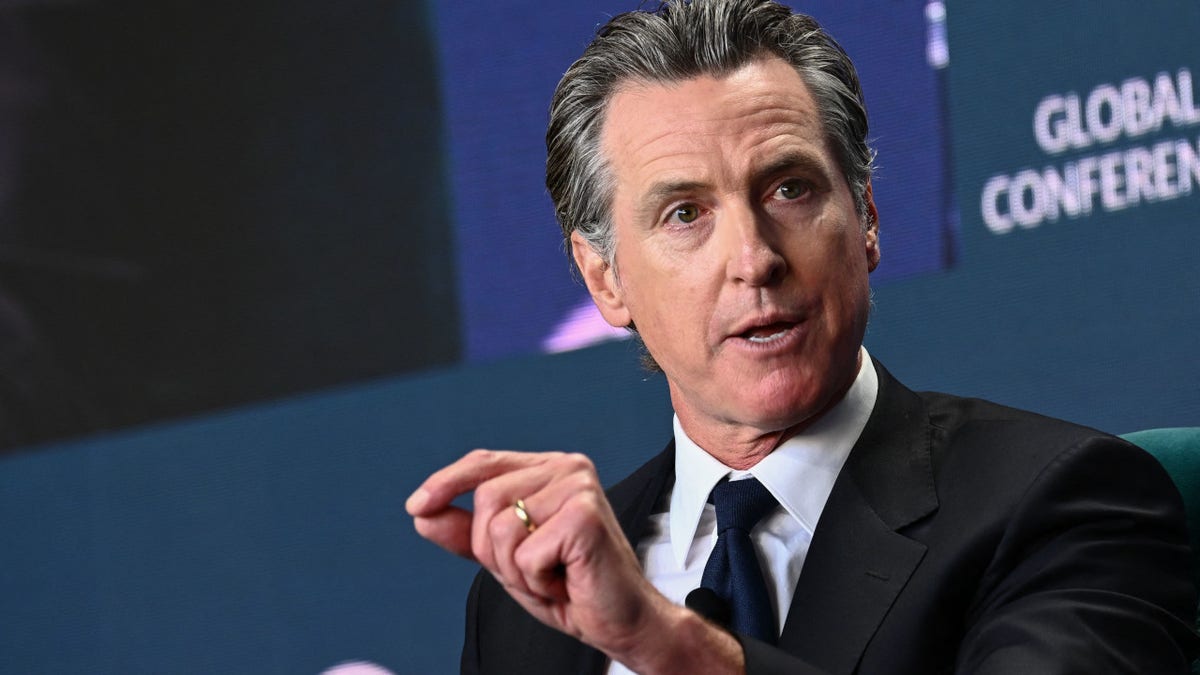Nobody wins in this push for electric vehicles besides China: Lisa Boothe
"The Big Weekend Show" co-hosts weigh in on Transportation Secretary Pete Buttigieg admitting to a shortage of EV chargers amid the United Auto Workers strike.
Democrat Connecticut Gov. Ned Lamont is withdrawing his plan to mandate future electric vehicle (EV) purchases after the proposal received bipartisan pushback from lawmakers on a key legislative panel.
Lamont ultimately pulled the proposal just four months after unveiling it and characterizing it as "decisive action to meet our climate pollution reduction targets." In July, Lamont unveiled the proposal, tethering Connecticut's emissions standards to those set in California, which mandates that every passenger vehicle sold is electric by 2035, the most aggressive target of its kind nationwide.
"Common sense has prevailed," Connecticut Senate Republican Leader Kevin Kelly said in a statement. "The Governor’s decision to withdraw the regulations is a reasoned approach to address the growing concerns raised by working and middle-class families. Adopting California emission standards which ban the sale of gas-powered cars is a substantial policy shift which must be decided by the General Assembly."
"There are too many questions regarding the capacity of our electric grid, the cost and location of grid improvements, and the negative impact on urban, rural and working poor families," Kelly added. "More than 90% of our pollution comes from outside the control of Connecticut. We need a national – and international – approach to improve our air quality. A state-by-state strategy will only prolong the attainment of cleaner air."

"Connecticut and our neighboring states are taking decisive action to meet our climate pollution reduction targets," Democrat Connecticut Gov. Ned Lamont said after releasing the proposal in July. (AP Photo / Jessica Hill / File)
Kelly is one of the Republican members of the Connecticut General Assembly's 14-member bicameral Legislative Regulation Review Committee, which is tasked with approving regulations proposed by state agencies.
The GOP minority leader and other Republicans on the panel led opposition to the proposed EV mandate over the last several months. After Democrats on the committee voiced concerns with the regulations, Lamont ultimately pulled the proposal from the agenda of a committee hearing Tuesday, when lawmakers were set to vote on it.
BEIJING-BACKED GREEN ENERGY FIRM IS EXPANDING IN US, POSING SERIOUS NATIONAL SECURITY RISK: REPORT
"This is a prudent step," said Connecticut state Sen. John Kissel, the panel’s GOP co-chair. "The people’s elected representatives are the ones who should be making this decision. Something so life-changing – something that will take our choice away – needs to be decided by the full state legislature."
"Ask anyone on a Main Street anywhere in Connecticut those questions," he added. "They will tell you that they – the people – should get to decide. It should be the people’s choice. The people of Connecticut deserve credit for speaking out. I thank my colleagues on the committee – and the governor – for withdrawing these regulations."
Another Republican on the panel, state Sen. Paul Cicarella, said Democrats realized "there was no plan to implement" the EV mandate proposed by Lamont.

Opponents of Lamont's proposal said Connecticut lacks the proper charging infrastructure to support a future EV mandate. (Eric Thayer / Bloomberg via Getty Images / File)
In addition to the EV mandate mirroring California's regulations, under Lamont's proposal released in July, 75% of trucks and buses would need to be electric by 2035. The passenger car mandate was enabled by a bill passed by the Connecticut legislature in 2003 that ties the state's clean air rules to California’s program. The latter mandate impacting trucks and buses was enabled by the 2022 Connecticut Clean Air Act.
Last year, the Environmental Protection Agency reinstated California’s authority under the Clean Air Act to implement its own emission standards and electric vehicle sales mandates, allowing other states to also adopt California's rules. The state then approved its 2035 mandate, which states such as New Mexico and New Jersey have followed.
BIDEN'S AMBITIOUS EV PLANS COULD MAKE US MORE DEPENDENT ON CHINESE SUPPLY CHAINS, EXPERTS WARN
Lamont's decision to halt the proposal marks a setback for the EV industry and is an unexpected blow to environmentalists who have advocated for such mandates nationwide. Democrats have dominated control of the Connecticut General Assembly for years and maintain a large majority in both the state Senate and House of Representatives.
"The Committee’s failure to advance these regulations aligns Connecticut’s environmental policy with that of Alabama, Mississippi and West Virginia rather than Massachusetts, New York, Rhode Island and the dozen other states we’ve been proud to call our clean air partners," Charles Rothenberger, climate and energy attorney with Connecticut-based Save the Sound, told Fox News Digital.
"Unfortunately, we will now lose one more critical year in which the environmental, health and economic benefits of this program are not enjoyed by Connecticut’s residents," Rothenberger said. "And there will be less consumer access to cutting-edge, low-cost clean vehicles as these vehicles are shipped elsewhere."

California Gov. Gavin Newsom's administration implemented a 2035 EV mandate after the EPA reinstated his state's authority to implement its own emission standards. The move also allowed other states to mirror the aggressive regulations. (Patrick T. Fallon / AFP via Getty Images / File)
The Sierra Club Connecticut, Conservation Law Foundation, Acadia Center, Union of Concerned Scientists, Nature Conservancy, Environment Connecticut and Connecticut League of Conservation Voters also ripped Lamont's action Tuesday.
"It is outrageous that members of the regulations review committee overstepped their bounds to roll back environmental progress and block important clean air regulations," said Lori Brown, executive director of the Connecticut League of Conservation Voters. "If our state fails to move forward, it will be due to partisan politics and not what is best for the people of Connecticut."
MORE THAN 3,000 AUTO DEALERS SIGN LETTER OPPOSING BIDEN'S ELECTRIC VEHICLE MANDATE
The environmentalists also blamed the fossil fuel industry for waging a lobbying campaign in Connecticut to block the mandate from passing the committee.
But energy industry and right-leaning groups in the state praised the failure of the proposal to move forward as a win for consumers.

This image shows a charging station on the Merritt Parkway in Connecticut. (Andrew Holbrooke / Corbis via Getty Images / File)
"This is a victory for consumers who would have paid a big price tag for the state's efforts to ban gas-powered cars and trucks in the future," said Connecticut Energy Marketers Association President Chris Herb. "However, the battle may not be over. It's unclear what could happen next, but CEMA will continue to be vigilant in our opposition to this reckless policy. This is too much too fast, and we are not ready for an EV-only future."
According to the group, the plan may effectively be killed, replaced with a watered-down version or be put up for a vote in the state legislature.
CLICK HERE TO GET THE FOX NEWS APP
"This is a victory for Connecticut’s people, who have the right to choose what cars and trucks they will drive – especially when there’s been no showing these burdensome, expensive regulations would actually improve the environment," Carol Platt Liebau, the president of conservative Connecticut think tank Yankee Institute, said in a statement to Fox News Digital.
"People overwhelmingly opposed the regulations because they would have placed significant costs on our state’s consumers and businesses and strained our energy infrastructure, without providing the global environmental benefits proponents claim. Innovation, developing technology and individual choice in the marketplace should guide car and truck sales in Connecticut – not government mandates."
Lamont's office didn't respond to multiple requests for comment.















































